On March 25, 2022, the Belt and Road Prospecting course, Tsinghua PBCSF’s newest innovative attempt to continue our EMBA program delivery in the post-pandemic era, commenced its final session – UAE - online. More than 50 students from the Tsinghua PBCSF BRI EMBA Program joined the session.
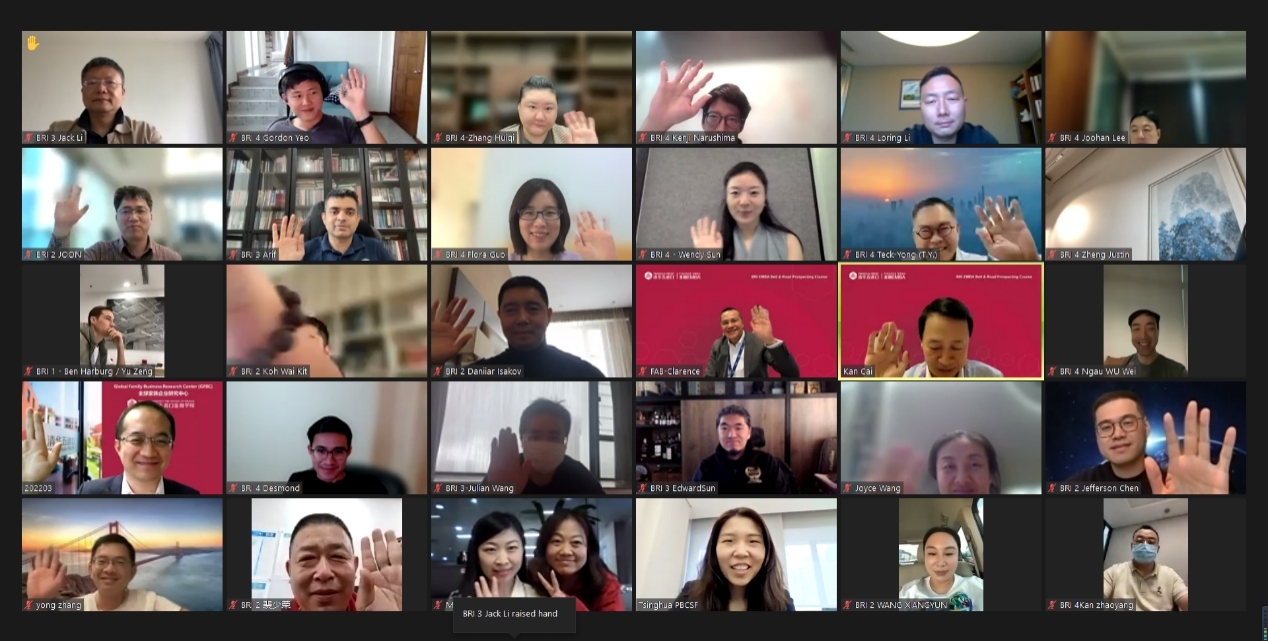
Students from the Tsinghua PBCSF BRI EMBA Program greeting one another during the Belt and Road Prospecting online course of Tsinghua PBCSF
Mr. Saeed Aleghfeli, Head of the Economic Affairs Section of the UAE Embassy in Beijing, opened the session by speaking on Sino-UAE economic relations. The diplomatic ties between the UAE and China were first established in 1984, totaling 38 years of prosperous and successful bilateral relationship. “We are very proud of our partnership with China, and the UAE is among the first countries to join the Belt and Road Initiative,” he said.
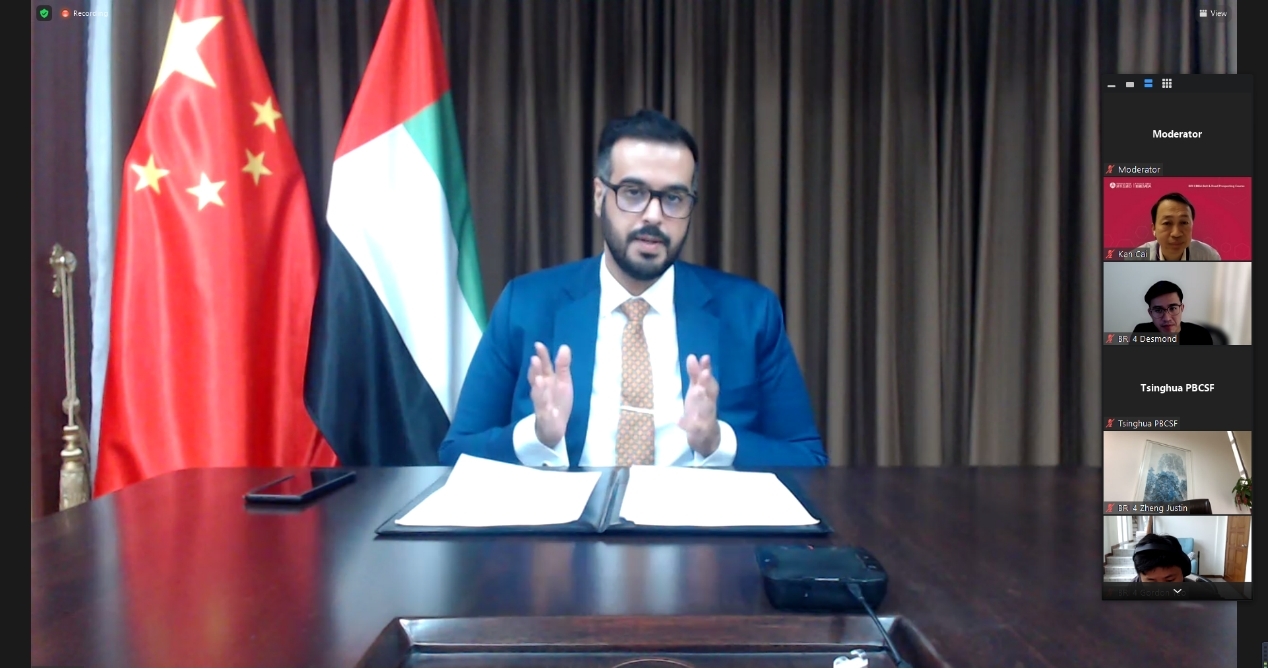
Mr. Saeed Aleghfeli, Head of the Economic Affairs Section of the UAE Embassy in Beijing, speaking on Sino-UAE economic relations
H.E. Dr. Thani bin Ahmed Al Zeyoudi then delivered a presentation overviewing UAE’s foreign trade as well as the current and future outlook for the UAE economy. Dr. Al Zeyoudi was appointed the UAE Minister of State for Foreign Trade, following the new UAE Government structure in July 2020. He also oversees the development of non-oil foreign trade sectors and the expansion of global partnerships, in addition to enhancing the investment climate in the country, in order to cement its position as a major business destination at the regional and global levels.
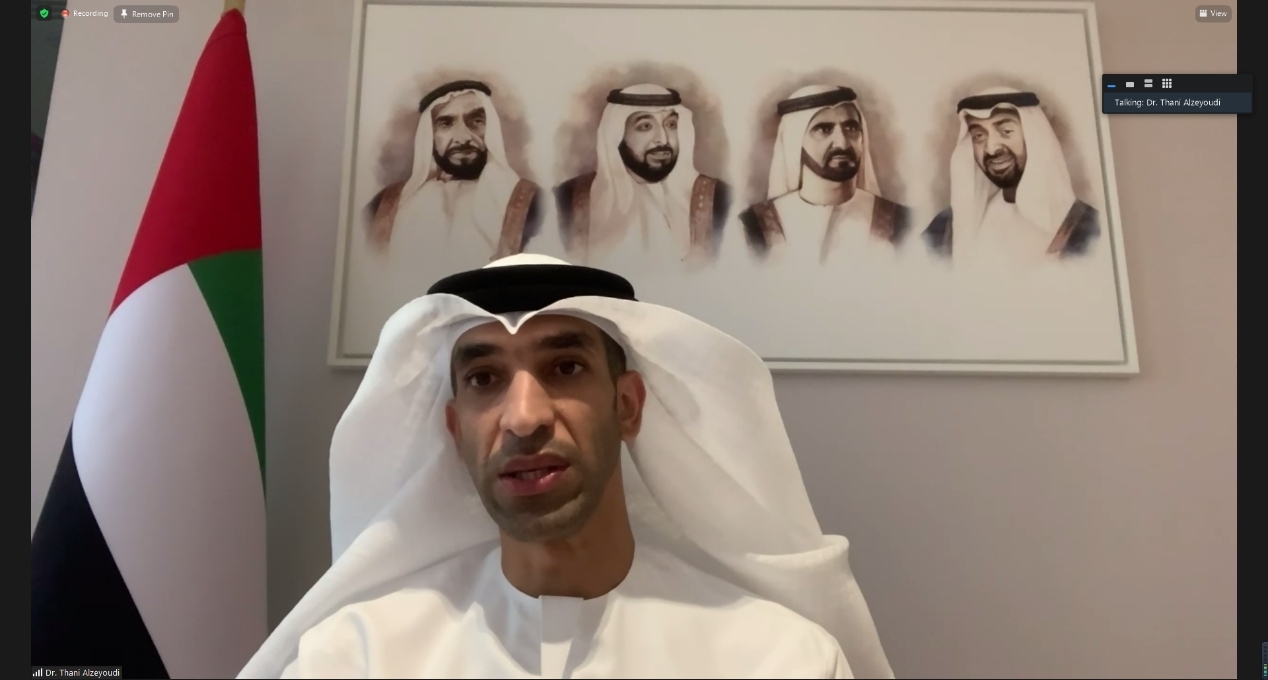
H.E. Dr. Thani bin Ahmed Al Zeyoudi, Minister of State for Foreign Trade of the UAE, addressing the students on the UAE foreign trade
Dr. Al Zeyoudi introduced the UAE by going over the country’s various sectors of oil and gas, travel and tourism, financial services, trade, and transport. In addition to the country’s unique advantages when it comes to attracting FDI, he also highlighted the UAE’s support for tech innovation. The UAE aims to double the size of its economy to US$ 800 billion by 2031, mainly via trade, industrial manufacturing, and investment. Dr. Al Zeyoudi also identified the key sectors for future growth, including Fintech, space, ICT, healthcare and life sciences, renewable energy, as well as entertainment, streaming and gaming.
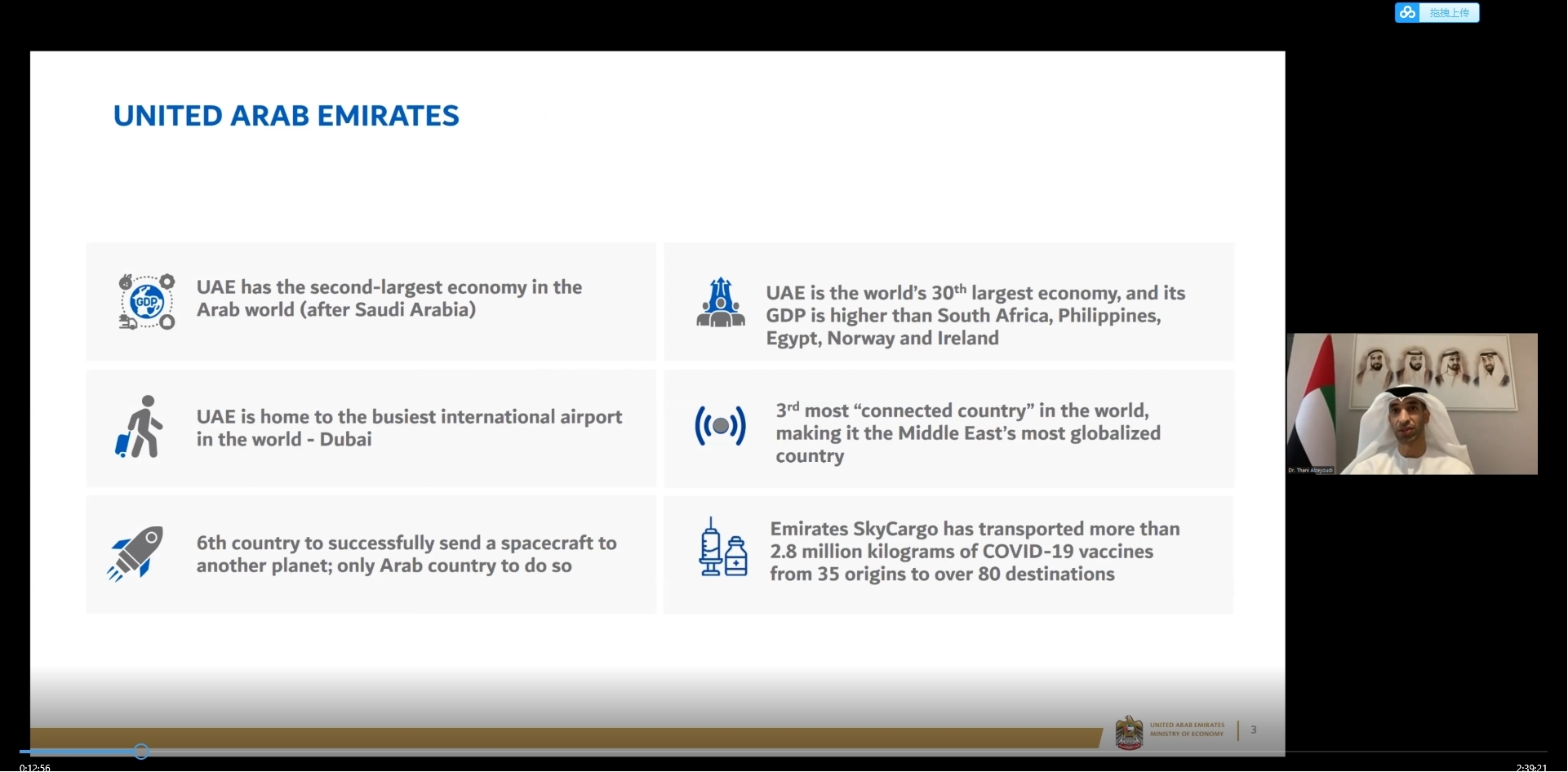
The UAE at a glance
Mr. Cheng Wang is diplomat, officer and analyst with more than 15 years of extensive experience in Gulf Cooperation Council (GCC) & broader MENA issues for the Ministry of Commerce of China (MOFCOM). He has served in Lebanon, Saudi Arabia & Oman for a number of years. Mr. Wang is also a part-time research fellow for Gulf Arab States Research Centre of Beijing Foreign Studies University. He discussed situating the UAE in the Belt and Road Initiative.
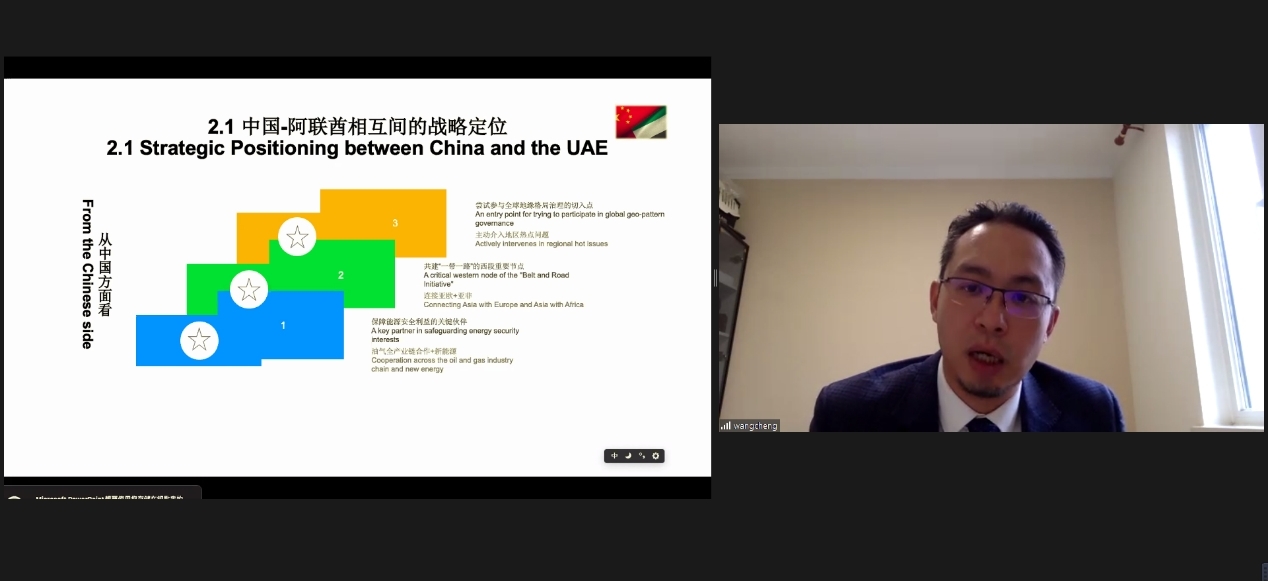
Mr. Cheng Wang, Deputy Director of the MENA Department of MOFCOM, addressing the students on Sino-UAE relations
After briefly looking over the six dimensions of the China-UAE economic and trade cooperation, Mr. Wang delved into why the UAE has been the focus of China’s Middle East strategy. From the side of the gulf country, China is a major partner in development and a major oil export market; it can also act as a positive force in regional security. For China, the UAE is a critical western node of the Belt and Road Initiative, a key partner in safeguarding energy security, and serves as an entry point for trying to participate in the global geo-pattern governance. The UAE stands out from the region because of its development concept pursing excellence, its leading pluralistic reform, its open and inclusive social structure, and its radiating geographical advantage.
Mr. Clarence Singam Zhou is the Head of International Banking Group at First Abu Dhabi Bank, leading the bank’s business growth across the FAB’s International network. He spent his entire career in the financial services industry, primarily in Structured and Corporate Finance, and has previously worked at PwC, Rabobank, Macquarie Securities and Temasek Holdings. He shared with the students his expertise in the financial and banking industry.
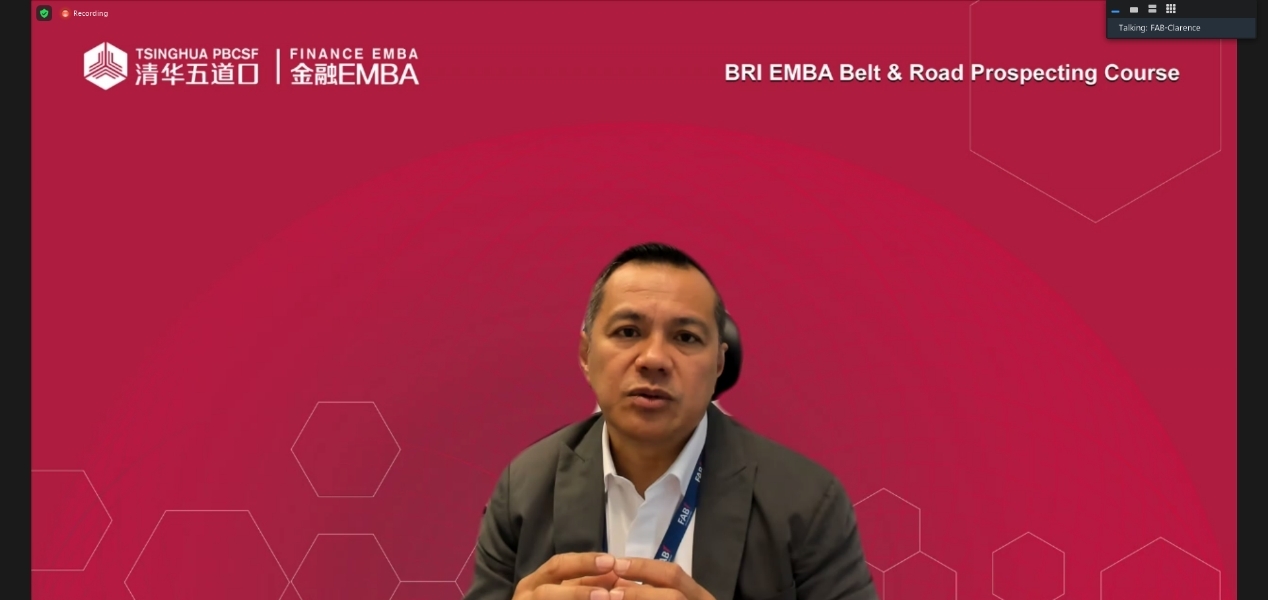
Mr. Clarence Singam Zhou, Head of International Banking Group at First Abu Dhabi Bank (FAB), speaking on finance and the banking industry in the UAE
“Driven by higher oil prices, increasing business & consumer confidence and world leading COVID-19 vaccination program along with government initiatives & stimulus measures, the UAE’s economy is on a robust growth trajectory,” Mr. Zhou said. He also expanded on the FAB, the UAE’s largest bank, and discussed China’s investment trends in MENA, providing detailed analyses on trade flows.
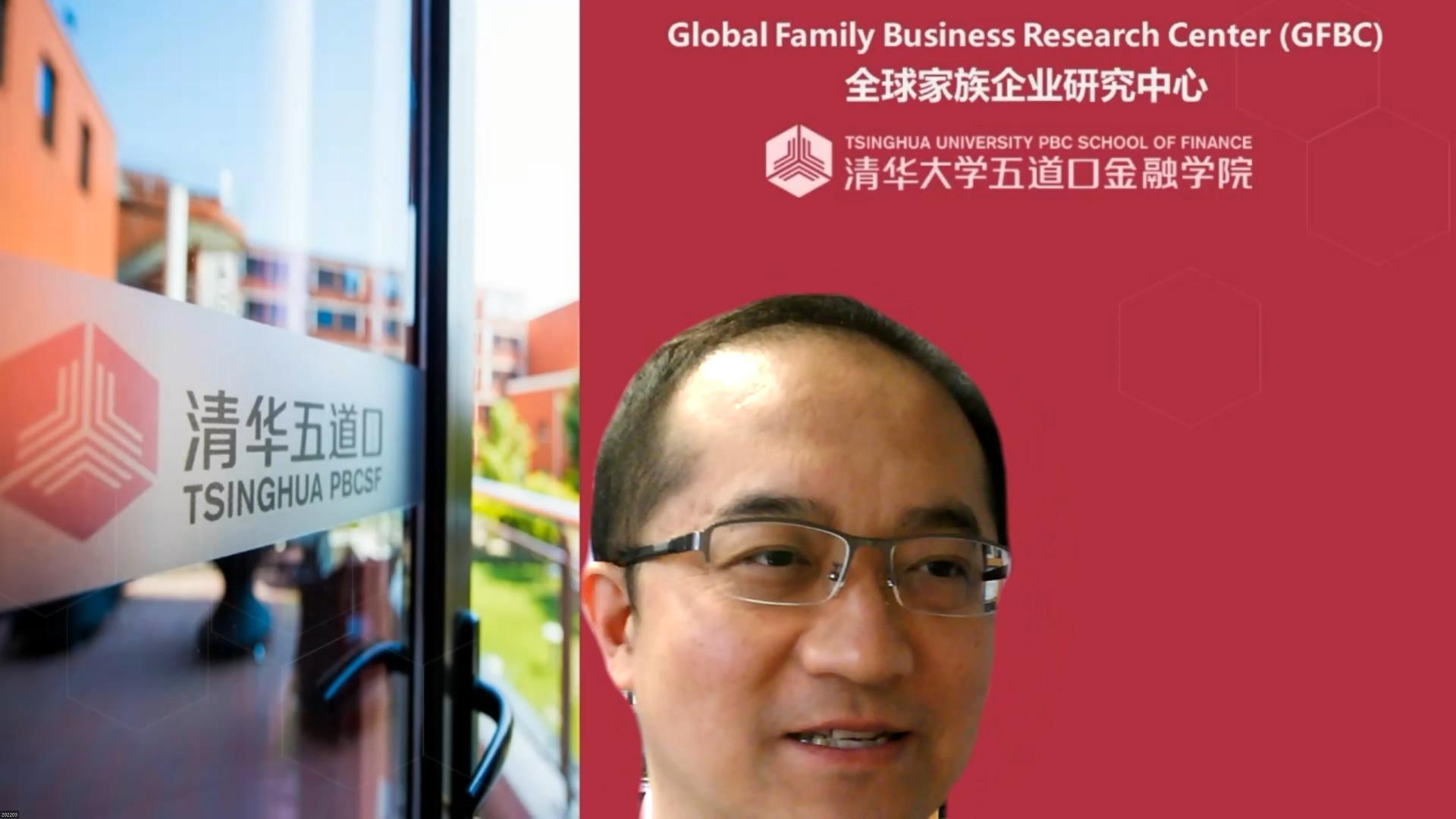
Prof. Hao Gao, Global Family Business Research Center (GFBC) of Tsinghua National Institute of Financial Research
In the end of the course, Prof. Hao Gao of the Global Family Business Research Center of Tsinghua National Institute of Financial Research congratulated the successful conclusion of the Belt and Road Prospecting Course. He said that this course is a new initiative to explore the political, economic and social perspectives for countries of great importance in the Belt and Road area, because mutual understanding and trust are the foundations for cross-border business collaborations, especially in geopolitically turbulent times as now.
The Belt and Road Prospecting course, co-developed with the Global Family Business Research Center of Tsinghua National Institute of Financial Research, aims to invite relevant experts to participate in all aspects of the course by a BRI country's economic policy makers, embassy/government officials, business leaders and senior scholars, to illustrate to the students the country's social and economic environment, its unique economic and financial as well as sustainable development, and its latest progress, helping the students deepen the understanding of the country's investment environment and business opportunities, so as to construct a better understanding of the Belt and Road Initiative and countries along the route.
The course held its Thailand session on March 10, Saudi Arabia session on March 22, Singapore session on March 24 before today’s finale.
Since its inception in May 2017, the Belt and Road Initiative (BRI) EMBA Program has attracted more than 200 high-level enterprise decision-makers from 23 countries and regions, including Singapore, Indonesia, Malaysia, Thailand, the United States, Canada, Kyrgyzstan, Kazakhstan. A number of students from Southeast Asian Countries hold Tan Sri, Dato' Sri, Dato’, Tengku and other honorary titles. Nearly 40% of the students graduated from world-renowned universities such as MIT, Stanford, Harvard, Yale, Cornell, Oxford, Cambridge and Imperial College London.